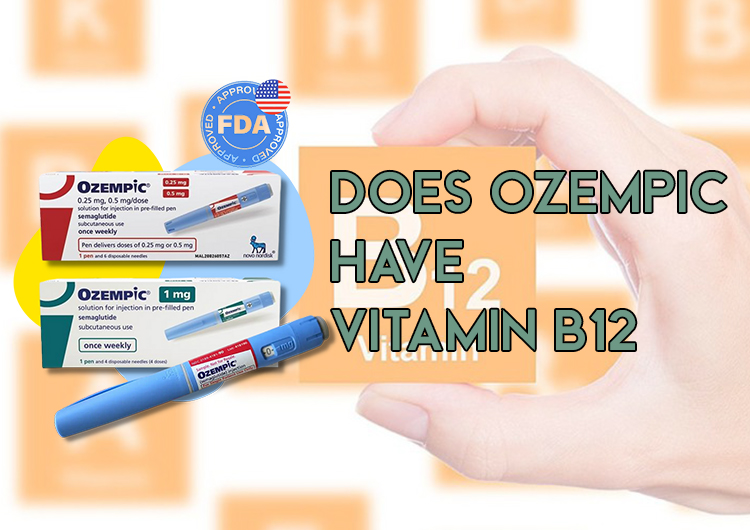
Ozempic has also been associated with severe side effects, including diseases of the pancreas, gallbladder, and kidney, as well as severe allergic reactions. However, whether this reaction is caused by semaglutide itself is currently unknown.
What is Vitamin B12?
Vitamin B12 is a water-soluble vitamin essential to producing red blood cells and maintaining normal nerve function, as well as contributing to controlling homocysteine levels in the body, which are crucial components of cardiovascular wellness. You can find vitamin B12 in foods like meat, fish, eggs, dairy products, and cereals; its absorption takes place via intrinsic factors produced by your stomach.
People having trouble digesting vitamin B12 may benefit from taking a supplement in oral form, such as cyanocobalamin or methylcobalamin; nasal gels, sublingual sprays, or injections with hydroxocobalamin may be administered instead. Without enough B12 in their bodies, anemia occurs, leading to health risks that include diminished red blood cells carrying oxygen throughout. Vitamin B12 deficiency can cause permanent nerve damage as well as impaired growth during gestation or infant development.
Why is Vitamin B12 important?
Vitamin B12 is essential for blood cell formation, nerve function, and DNA formation. Furthermore, it has been found to lower elevated homocysteine levels – a risk factor for heart disease – significantly.
Vitamin B12 can be found naturally in meat, dairy products, and eggs, as well as through supplementation. If too little Vitamin B12 is consumed, it can lead to anemia – which results in low levels of red blood cells – with symptoms including fatigue, weight loss, and memory problems.
Vitamin B12 is water-soluble and excreted through urine. Therefore, taking high doses of B12 supplements without adverse interactions or interactions is generally safe; however, it’s wise to consult your physician prior to beginning any new supplement regimen, as their advice could include taking it with food in order to maximize absorption.
How does Vitamin B12 Work?
Vitamin B12, commonly referred to by its various names, such as cobalamin, cyanocobalamin, and hydroxocobalamin, is an essential water-soluble vitamin needed by our bodies for maintaining healthy nerves, cells, and blood. It also plays an integral part in warding off anemia, which makes you tired and weak. Available both as multivitamins as well as prescription injections, nasal gel treatments, and sublingual tablets that dissolve sublingually under the tongue, Vitamin B12 is essential in maintaining optimal nerve, cell, and blood health.
Human bodies normally obtain vitamin B12 through food and dietary supplements. It’s bound to proteins in food products like meat products; when we eat, digestive enzymes break apart the protein to release vitamin B12. Once in your stomach, a protein called intrinsic factor transports it towards the ileum for absorption. Unfortunately, people suffering from pernicious anemia don’t produce enough intrinsic factors and thus cannot absorb enough Vitamin B12. Without enough intrinsic factor production, symptoms of deficiency include fatigue, loss of appetite, weight loss, diarrhea, tingling hands/feet, tingling in hands/feet as well as depression.
What are the Benefits of Vitamin B12?
B12 can do much more than prevent deadly blood conditions – it also contributes to increased energy. B12 helps form healthy red blood cells, creates DNA, nourishes the brain and nervous system, and can even be created synthetically in labs. Meat, fish, dairy products, and breakfast cereals contain B12 naturally; you can also order it online from specialty pharmacies or pharmacies. Annie Oakley from Buffalo Bill’s Wild West Show suffered from severe B12 deficiency before she died in 1926.
People unable to maintain adequate vitamin B12 blood levels via diet alone may require oral supplements or injections in order to keep up their levels, such as those who suffer from a digestive condition that prevents their stomachs from producing enough acid (Crohn’s disease or gastric bypass surgery) or those undergoing gastric bypass surgery.
Medication such as proton pump inhibitors used to treat acid reflux and peptic ulcer disease or H2 blockers like Prilosec, or Prevacid can reduce stomach acid, increasing the risk of B12 deficiency. Furthermore, vegetarians or vegans often don’t receive enough B12 through diet alone.